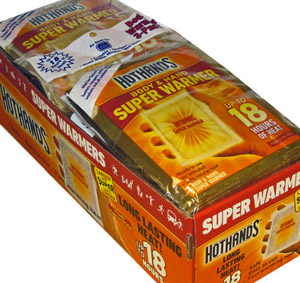Woman Uses Heat Packs For Pain Relief, Burns 4 Holes In Breasts, Sues
 When you need to relieve pain after a surgery and can’t walk around tethered to a heating pad all day, a small portable handwarmer is a suitable substitute…isn’t it? One woman thought so. According to court documents, she nestled them between her shirt and skin after reconstructive breast surgery. From the mention of “court documents,” you can probably guess how this ended.
When you need to relieve pain after a surgery and can’t walk around tethered to a heating pad all day, a small portable handwarmer is a suitable substitute…isn’t it? One woman thought so. According to court documents, she nestled them between her shirt and skin after reconstructive breast surgery. From the mention of “court documents,” you can probably guess how this ended.
Heatmax hand warmers advertise “safe, natural heat” on the box. What the woman’s complaint claims the box doesn’t contain is a warning that it can cause chemical burns if placed close to the skin for long periods.
Not next to the skin: close to the skin. She placed the packs between her shirt and bra for pain relief. Hours later, she noticed that the pain was getting worse instead of better. That was because the who heat packs had caused two large burns in the skin on her breasts.
She had four contact burns in the spots where she had placed the heat packs: two in each breast. Her surgeon certified that the wounds were burns, not an after-effect of her surgery or any kind of infection.
Now she’s suing Walmart and the heat pack’s manufacturer, claiming that the packs can be more harmful than the packaging makes them appear. If a consumer wants to learn that Heatmax packs shouldn’t make direct contact with the skin, the plaintiff’s initial complaint claims, they have to visit an internal page on the product’s website. There is allegedly no such warning on the package.
Said product’s harmful characteristics and consequences outweigh the benefits of its design, specifically its regularly heating to temperatures sufficient to cause second and third degree burns, when it is only sold as a product providing comforting warmth.
The suit accuses both companies of negligent design, negligent instruction, and makes strict liability claims.
Complaint [PDF Download] (via Breaking News USA – thanks, Mindy!)
Want more consumer news? Visit our parent organization, Consumer Reports, for the latest on scams, recalls, and other consumer issues.

